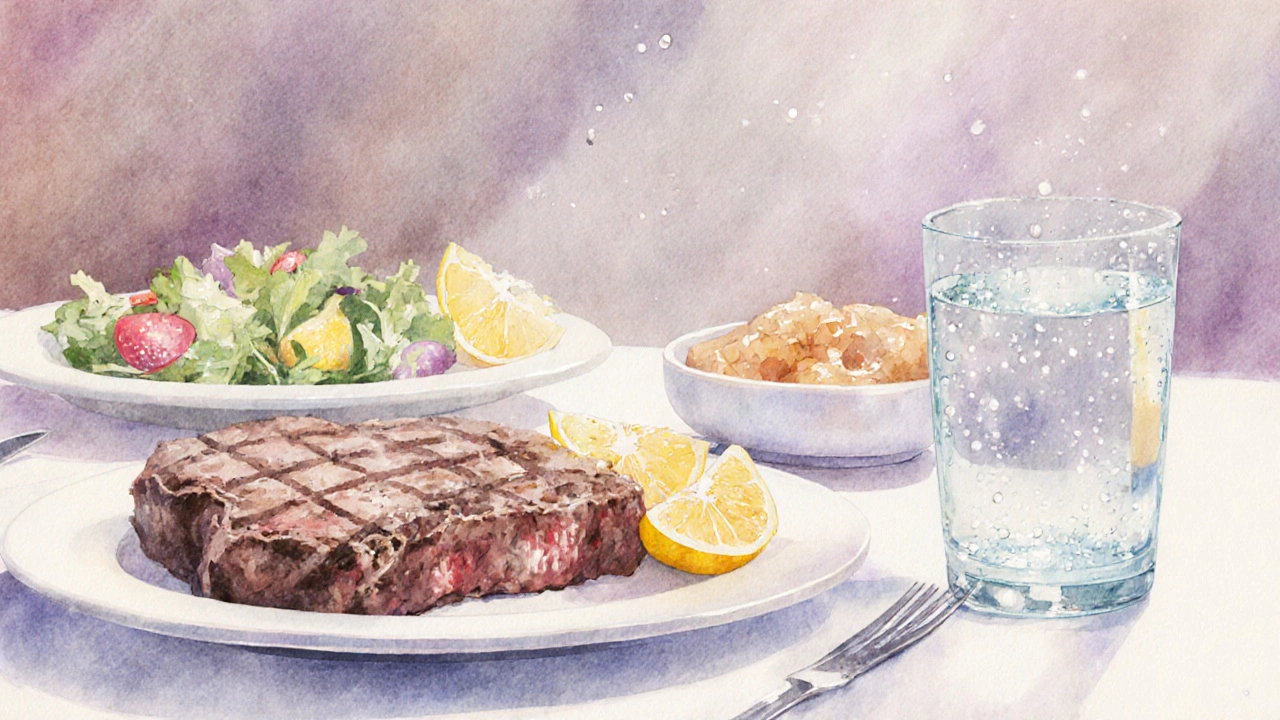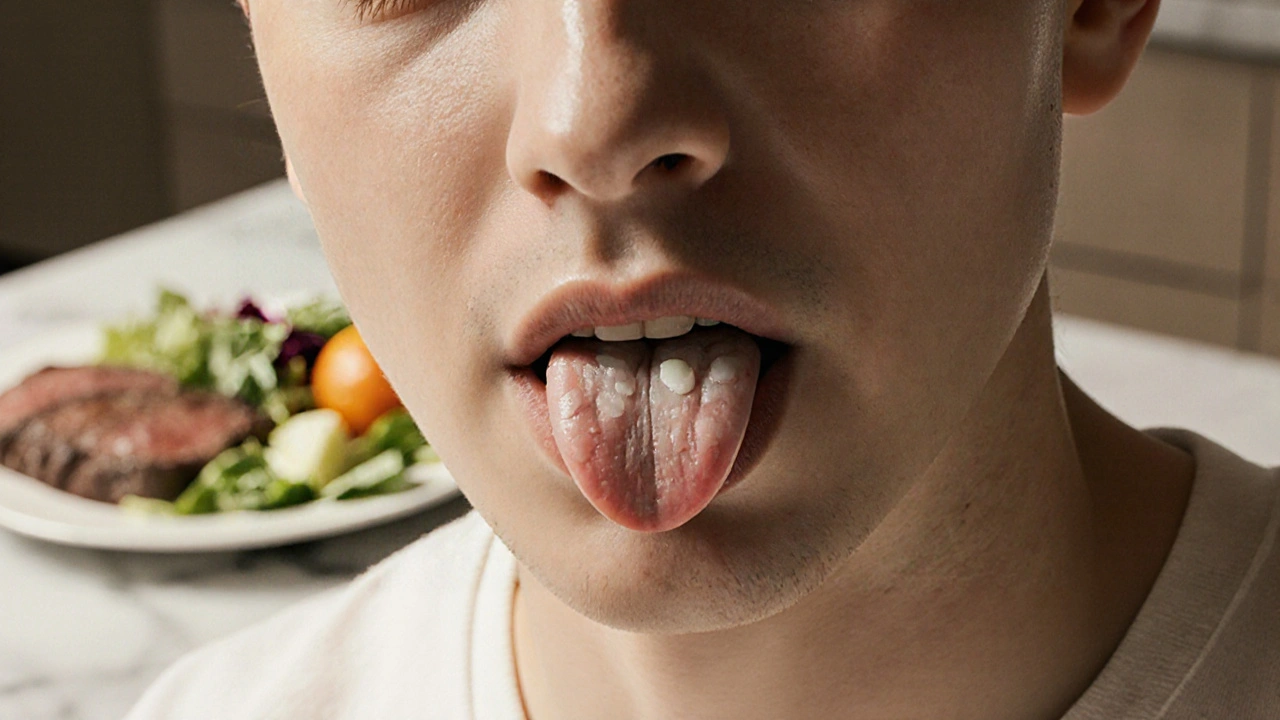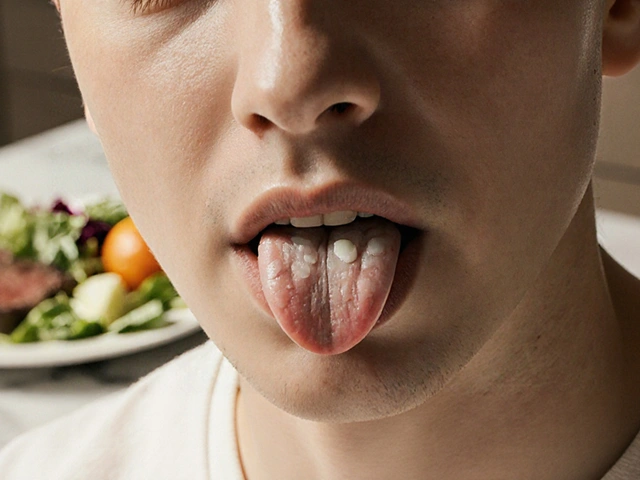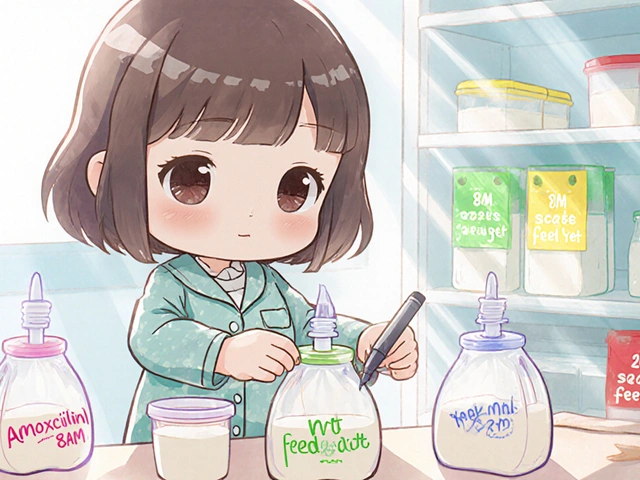Dry Mouth Impact Checker
Your Results:
dry mouth can feel like a harmless nuisance, but it silently reshapes the way you experience food and even how much you want to eat.
TL;DR
- Dry mouth reduces saliva, blunting taste signals and making food feel bland.
- Altered taste often leads to cravings for salty or sugary foods.
- Reduced enjoyment can shrink appetite, causing weight loss or nutrient gaps.
- Common triggers include medications, dehydration, and certain medical conditions.
- Simple steps-hydration, oral moisturizers, and diet tweaks-can restore flavor and hunger.
What Exactly Is Dry Mouth?
When you hear “dry mouth,” think of dry mouth (xerostomia) as a condition where the salivary glands don’t produce enough fluid to keep the mouth moist. Saliva isn’t just water; it’s a mix of enzymes, electrolytes, and proteins that lubricate, cleanse, and start the digestion of starches. Without it, the mouth becomes a dry landscape that can’t support normal taste perception.
How Saliva Shapes Your Taste Buds
Taste buds sit on small bumps called papillae, and they rely on saliva to dissolve food particles. When you bite into an apple, saliva coats the surface, releasing sugars that bind to the sweet receptors. Taste buds themselves don’t change, but the signal sent to the brain weakens if there isn’t enough saliva.
Researchers at the University of Manchester (2024) found that individuals with chronic dry mouth report a 30% drop in taste intensity across sweet, salty, sour, and bitter categories. That’s why even your favorite pizza can taste like cardboard.
Appetite Takes a Hit
When flavors fade, the brain’s reward system kicks in less often. Appetite is driven partly by how enjoyable eating feels. If every meal feels bland, you’re less likely to eat enough calories, which can lead to weight loss or, paradoxically, overeating of strongly flavored snacks to compensate.
One small study of 80 seniors with xerostomia showed that 45% reduced their overall food intake, while 20% turned to sugary drinks to chase a fleeting sense of flavor. Both outcomes raise red‑flag health concerns.

Common Triggers of Dry Mouth
| Cause | Typical Onset | Key Symptoms | First‑Line Management |
|---|---|---|---|
| Medication side effects | Within days of starting | Sticky feeling, cracked lips | Ask doctor about alternatives or dose adjust |
| Dehydration | Hours of low fluid intake | Thirst, dark urine | Increase water, electrolyte drinks |
| Diabetes (poor control) | Months to years | Frequent urination, dry mouth | Better glucose management, saliva substitutes |
| Radiation therapy (head/neck) | During/after treatment | Severe dryness, ulceration | Prescription fluoride, hourly rinses |
| Sjögren’s syndrome | Gradual | Dry eyes, chronic oral dryness | Immunomodulatory meds, pilocarpine |
Practical Ways to Boost Saliva and Flavor
- Stay hydrated: aim for 2‑2.5L of water daily, sipping throughout the day rather than gulping.
- Add a splash of citrus or cucumber for a mild stimulant.
- Chew sugar‑free gum or suck on lozenges that contain xylitol; the mechanical action triggers salivary flow.
- Incorporate moisture‑rich foods: soups, stews, yogurt, and fruit salads.
- Season with herbs and spices instead of salt to re‑ignite taste receptors.
- Use over‑the‑counter saliva substitutes-sprays, gels, or mouthwashes containing carboxymethylcellulose.
- Limit alcohol and caffeine, which are diuretics that thin saliva.
- Ask your doctor about pilocarpine or cevimeline if you have chronic xerostomia.
When Dry Mouth Signals a Bigger Issue
If you notice persistent mouth sores, difficulty swallowing, or a sudden weight change, it’s time to book an appointment. Dental professionals can assess saliva flow with a sialometry test and look for early decay-dry mouth increases cavity risk by up to 40%.
Because saliva also protects against infection, chronic dryness can pave the way for oral thrush and gum disease. Early intervention keeps both taste and overall health in check.
Quick Checklist: Is Your Dry Mouth Affecting Your Meals?
- Do foods taste muted or “flat”?
- Are you reaching for salty, sweet, or overly flavored snacks more often?
- Has your daily calorie intake dropped in the last few weeks?
- Do you experience cracked lips, tongue soreness, or a feeling of stuck food?
- Are you on any new medications or experiencing high stress?
If you answered “yes” to three or more, try the hydration and oral care tips above, then follow up with a healthcare provider.
Frequently Asked Questions
Can dry mouth cause weight loss?
Yes. When flavor diminishes, meals become less appealing, leading many people to eat less overall. Over time, this calorie deficit can result in noticeable weight loss.
Is it normal for dry mouth to make food taste salty?
Absolutely. Saliva normally balances sodium perception. With less fluid, salty compounds linger longer on the tongue, making even low‑salt foods seem overly salty.
Do over‑the‑counter saliva substitutes really help?
They can provide temporary relief, especially when combined with frequent water intake and gum chewing. Look for products with carboxymethylcellulose or glycerin for best lubricating effect.
Are there any foods that can naturally boost salivation?
Citrus slices, pickles, and ginger are known to stimulate salivary glands. Adding a few bites of these to a meal can jump‑start flavor perception.
When should I see a dentist about dry mouth?
If you notice recurring cavities, mouth sores, or a constant feeling of stickiness, schedule a dental visit within a month. Early treatment can prevent long‑term damage.







siddharth singh
September 29, 2025 AT 16:49Dry mouth, medically known as xerostomia, isn’t just an inconvenience-it fundamentally disrupts the cascade of biochemical events that allow us to perceive flavor.
Saliva acts as a solvent, breaking down complex food molecules so that taste receptors can bind to sugars, salts, acids, and bitter compounds.
When salivary flow diminishes, the concentration of these tastants on the papillae drops dramatically, leading to a muted sensory experience.
Researchers at the University of Manchester documented a roughly 30 % reduction in taste intensity across all primary flavors in individuals with chronic dry mouth.
This blunting effect often drives people to seek out foods with exaggerated seasoning to compensate for the loss of nuance.
Consequently, you’ll find an increased preference for high‑sodium snacks, sugary drinks, or heavily spiced meals.
Such dietary shifts can have downstream metabolic consequences, including elevated blood pressure and impaired glucose regulation.
Beyond taste, saliva contains enzymes like amylase that initiate starch digestion, so reduced flow can subtly impact post‑prandial glucose spikes.
The lack of lubrication also makes chewing and swallowing more effortful, which can suppress appetite simply because eating feels laborious.
In the elderly, this often translates to unintentional weight loss and nutrient deficiencies, a concern frequently overlooked by primary care physicians.
Medications, especially anticholinergics, are a common iatrogenic cause; a quick review of a patient’s drug list can reveal reversible contributors.
Hydration alone helps, but water does not replace the electrolytes and mucins that give saliva its protective viscosity.
Practical interventions include sugar‑free gum, xylitol lozenges, and saliva substitutes containing carboxymethylcellulose.
In more severe cases, prescription agents like pilocarpine or cevimeline stimulate residual glandular activity.
Angela Green
October 8, 2025 AT 08:08While the article is comprehensive, there are a few grammatical oversights that could be tidied up for clarity; for example, “dry mouth reduces saliva, blunting taste signals and making food feel bland” should use a comma after “saliva” to separate the clauses.
Additionally, “simple steps‑hydration” would read better as “simple steps-hydration”.
Overall, great content that just needs a quick polish! 😊
April Malley
October 16, 2025 AT 23:26Wow, this is super helpful, especially the bit about chewing gum, and I love that you listed citrus and ginger as natural stimulants, they’re such easy additions to any meal, and the reminder to sip water throughout the day is a classic but essential tip, keep up the great work, guys! 😄
scott bradshaw
October 25, 2025 AT 14:44Wow, because dry mouth is totally a groundbreaking discovery.
michael henrique
November 3, 2025 AT 05:03People often underestimate how meds like antihistamines can screw up your saliva flow, so always ask your doc about alternatives.
If you’re dehydrated, speed up water intake, and if you’re still dry, look into saliva substitutes.
Jamie Balish
November 11, 2025 AT 20:21I totally get how frustrating it is when every bite feels like chewing on cardboard, and the good news is that you have many simple tools at your disposal.
First, keep a water bottle handy and sip often, even if you don’t feel thirsty, because the brain can misinterpret mild dehydration.
Second, chew sugar‑free gum or suck on xylitol lozenges after meals; this mechanical stimulation triggers parasympathetic pathways that boost salivation.
Third, incorporate moisture‑rich foods such as broth‑based soups, stews, and fruit salads with melons or oranges; these not only hydrate but also provide natural acids that activate taste buds.
Don’t forget to season your dishes with fresh herbs like basil, cilantro, or mint, which can enhance perceived flavor without adding excess salt or sugar.
If you’re on prescription meds, request a review from your pharmacist; sometimes a dosage tweak or a switch to a different class can mitigate xerostomia.
For chronic cases, discuss prescription sialagogues like pilocarpine with your physician; they’ve shown efficacy in stimulating residual gland function.
Lastly, maintain good oral hygiene-use fluoride toothpaste and an alcohol‑free mouthwash to protect your teeth, since dry mouth raises cavity risk.
Staying proactive now can prevent bigger health issues down the line, and you’ll rediscover the joy of actually enjoying your favorite foods again.
Sharon Bruce
November 20, 2025 AT 11:39Totally agree! 🙌 Staying hydrated and chewing gum made a huge difference for me; the taste of soup feels so much richer now. 🍲💧
True Bryant
November 29, 2025 AT 02:58Honestly, if you’re still ignoring the science, you’re basically choosing to starve your taste buds out of spite.
Saliva isn’t a luxury; it’s a critical component of oral homeostasis, digestive enzyme activation, and antimicrobial defense.
Skipping the recommended interventions is akin to refusing a seatbelt because you “feel fine” – a recipe for disaster.
Danielle Greco
December 7, 2025 AT 18:16Great points! 😎 I’ve started using the xylitol lozenges and my meals actually taste better now. 🎉👍
Beth Lyon
December 16, 2025 AT 09:34i think dry mouth is an probelm bcz it makes food not nice to eat, so you shouuld drink more water and maybe talk to doctor?
VAISHAKH Chandran
December 25, 2025 AT 00:53Hydration is key.
Pat Merrill
January 2, 2026 AT 16:11Ah, the classic “dry mouth” alarm – because we all love a good reminder that our bodies love to betray us with the most poetic of symptoms.
Sure, drink water, chew gum, and maybe see a dentist, but don’t forget that the ultimate irony is that you’re chasing flavor with sheer willpower.
Vicki Roth
January 11, 2026 AT 07:29I’m curious how many readers have actually tracked their water intake after reading this; the checklist seems like a handy self‑audit tool.
Vishal Bhosale
January 19, 2026 AT 22:48Dry mouth hurts. Drink water. Eat soup.
Garima Gauttam
January 28, 2026 AT 14:06Well, if you think drinking water solves everything, you’re clearly oversimplifying a complex physiological issue.
Georgia Nightingale
February 6, 2026 AT 05:24Honestly, this whole post feels like a rehash of every health blog out there, but at least it finally gave me a proper name for my “mouth desert” condition.
Chris Kivel
February 14, 2026 AT 20:43Hey everyone, just wanted to say that the tips here are solid and easy to follow – especially the part about using sugar‑free gum. Keep it up!
sonia sodano
February 23, 2026 AT 12:01Sure, all these suggestions are great, but have you considered that some people might just enjoy the “flat” taste and not need to fix it?